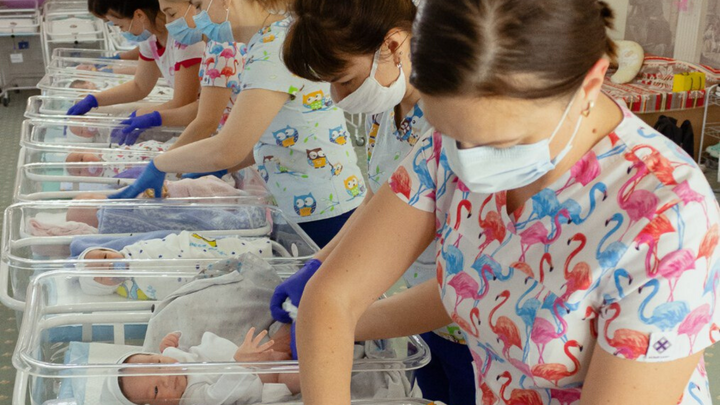Republicans are Using Coronavirus as an Excuse to Ban Surgical Abortions

Elective procedures are being cancelled at hospitals across the country as the medical system tries to make room for the demand due to COVID-19. Healthcare systems are already being pushed to capacity while hospital workers lack essential equipment like masks and respirators. Fears are mounting that it will only get worse, and many states are taking action to provide relief to healthcare workers and limit the unnecessary use of medical equipment.
Some states with Republican Governors and Attorneys General are taking advantage of the situation to push their own anti-abortion agendas. Ohio and Texas have both moved to label abortions as elective procedures in the past few days.
The bans do not apply to medical abortions, which are performed by taking medicine rather than surgery, and typically are available in the first trimester of pregnancy.
This is only the latest in a series of COVID-19 policies that are disproportionately affecting women.
Ohio
On March 18, the Ohio Department of Health ordered all “non-essential and elective surgeries” to be temporarily suspended. The order itself did not provide guidance on abortion, but the Attorney General’s office sent letters to at least two abortion providers ordering them to "immediately stop performing non-essential and elective surgical abortions."
Ohio only has six abortion providers and “has been on the forefront of abortion restrictions and regulations,” according to CBS.
Abortion providers are pushing back, though. At least five of the state’s abortions providers have said the procedure is “essential and time sensitive” and that they will be continuing with the procedures as planned.
Planned Parenthood Southwest Ohio Region (PPSWO) is taking many precautions to slow the spread of the virus, including triaging all appointments over the phone, closing the doors to walk-in appointments, and asking non-urgent patients to reschedule. They will, however, continue to provide surgical abortions.
In a statement, PPSWO reiterated that their surgeries are essential. “We are complying with the Ohio Department of Health’s order regarding personal protective equipment, which requires hospitals and surgical facilities to stop providing non-essential surgeries,” they said. “Under that order, Planned Parenthood can still continue providing essential procedures, including surgical abortion.”
Other clinics like The Women’s Med Center in Dayton and Preterm Cleveland have mirrored the sentiment.
The Women’s Med Center received a letter from the Ohio Deputy Attorney General Jonathan Fulkerson on Friday threatening to take action against them if they continued. “Non-essential surgical abortions are those that can be delayed without undue risk to the current or future health of a patient,” the letter stated. The Attorney General threatened to pursue legal action against the clinic.
Texas
On Sunday evening, Texas Governor Greg Abbott issued an executive order to suspend elective procedures. The stated goal was to “expand hospital bed capacity as the state responds to the COVID-19 virus.”
The next day, Texas Attorney General Ken Paxton issued a statewide order that abortions are banned through April 21, except in cases where the mother’s life is at risk. "No one is exempt from the governor's executive order on medically unnecessary surgeries and procedures, including abortion providers," said the statement. "Those who violate the governor's order will be met with the full force of the law."
The Attorney General threatened 180 days in jail or a fine of $1,000 for anyone performing non-essential abortions.
However, according to the Washington Post, only four percent of the nation’s abortions actually take place in hospitals. Texas women have already faced a slew of abortion restrictions in the state. The number of clinics providing abortion has been cut by two-thirds since 2005 thanks to TRAP laws.
Planned Parenthood of Greater Texas has stated that they are “reviewing Governor Abbott’s Executive Order to ensure compliance.” Their doors currently remain open.
Impact
These bans are occurring despite the fact that a surgical abortion requires only one visit (or two, in states where TRAP laws require a medically unnecessary visit 24 hours prior to the abortion). Pregnant women carrying to term, however, require between ten to 15 prenatal visits, and at least two postnatal visits—placing a much more serious strain on the medical system than an abortion would have. The overwhelming majority of surgical abortions are not performed at hospitals anyway but at specialized clinics.
Between six to eight percent of pregnancies result in high-risk complications, meaning they require much more intensive care. Abortion is far safer than giving birth, so forcing women to give birth during a global health care pandemic is not only cruel but ineffective at accomplishing the main goal of increasing healthcare capacity. If anything, limits on abortion should be lifted during the pandemic.
The women who will be most hurt by restricted access to abortion are those already likely to suffer most in the coronavirus economic collapse. Single women with children are the largest cohort of women who receive abortions nationwide. Eighty-six percent of women who get abortions are unmarried, and 59 percent already have other children. Fourteen percent have three or more children.
During the economic shutdown which has led to the closure of schools and daycare centers and unprecedented job loss, these are the families that can least afford a pregnancy right now. Twenty-three percent of women getting abortions say they can not afford a baby—and that was before this crisis. The average cost of an abortion is between $350 to $700. The average cost of pregnancy, on the other hand, is $10,808 in prenatal care and $30,000 in postnatal care.
Other states with similar elective procedure bans, like Massachusetts and Washington, have exempted abortion from their list of restricted procedures, demonstrating that these policies can certainly be put in place without limiting women’s constitutional rights.
Ironically, the anti-choice protesters behind the restrictions are ignoring public health guidelines themselves. On March 14, one abortion clinic in Charlotte reported at least 150 protesters outside their clinic. This is despite the fact that North Carolina Governor Roy Cooper has already advised bans on gatherings of more than 100 people at the time. Similar scenes have been reported across the country as “pro-life” protesters ignore social distancing guidelines and put the public at much greater risk than the abortion clinic itself.
This serves as just another reminder of why progressives must prioritize the courts in order to protect women in the coming elections.
The generous support of our readers allows 4W to pay our all-female staff and over 50 writers across the globe for original articles and reporting you can’t find anywhere else. Like our work? Become a monthly donor!
Enter your email below to sign in or become a 4W member and join the conversation.
(Already did this? Try refreshing the page!)




Comments